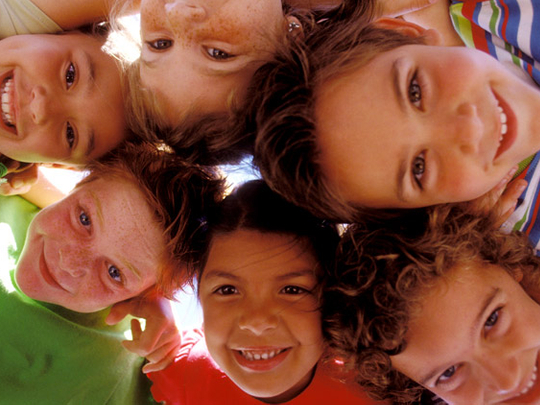
Dubai: As the UAE’s Child Protection Law takes effect on June 15, reporting cases of child abuse or negligence is now mandatory for all members of the community with the ultimate goal of transforming families and society and not dividing them.
The Federal Law No 3 of 2016, formerly named Wudeema Law, was drafted in the memory of Wudeema, an eight-year-old Emirati girl who was starved and tortured to death in Dubai by her father and his girlfriend in 2012.
The law ensures that every child in the UAE, whether a resident or tourist, has the right to live and be safe, be educated, and be protected from neglect and all forms of abuse, whether physical, sexual, verbal, emotional or psychological.
Children make up around 24 per cent of the UAE population based on 2010 figures. But statistics on the forms of abuse and how prevalent they are in the UAE are scant.
While there are obvious cases of abuse, there are grey areas when it comes to what is deemed as negligence. This is why educating the public on what is acceptable and unacceptable parenting is necessary, Khalid Al Kamda, director-general of the Community Development Authority in Dubai, said.
“Negligence can be typical things like having a child in the front seat or in the lap of a driver. That is negligence and that is a clear-cut line because you know the child is in danger. Police could stop the driver and fine him and they will do that. So there are cases which are clear-cut and there are grey areas,” Al Kamda told Gulf News.
Al Kamda stressed that any act that puts a child in harm’s way is prohibited by this law. Violators can be slapped with a fine ranging from Dh5,000 and Dh50,000 and/or imprisonment of not more than 10 years, depending on the violation.
But Al Kamda stressed that residents should not view the law as punitive but as restorative in general.
“It is not for us to start taking children away from their family. That is not the law. The law says the parents or the guardians are responsible for raising their children but to raise them according to acts that will not put the child in danger,” Al Kamda said.
“Because, at the end of the day, the child’s best environment is with his parents, with his family, not with us, not with anyone else.”
Child protection specialists may issue three written warnings to parents or guardians who are deemed to be neglecting their children and hold a seminar for them on the law. Repeat offenders will be dealt with accordingly and fined. Authorities, however, may immediately remove the child from an abusive environment if it endangers his or her life.
“If the family still does not understand child protection after several warnings, then it’s not a good place for the child. But this is only for the most extreme cases.”
Since in most cases of abus, the perpetrators are either family members or people close to the family, the children are scared to report the crime. This is where professionals such as teachers, physicians, or child-care services are mandated to step in. Under the law, all of them, including neighbours who suspect abuse or neglect, can also report to authorities, which is a step in the right direction, according to Dr Mohammad Tahir, a general, child and adolescent psychiatrist.
“If the child protection services find that there is something going on, like abuse is being carried out by parents or caretakers, [reporting the crime] actually helps the family. This is to guide the family to know the right way to rear a child,” Dr Tahir said.
“This child protection law actually protects the child on the one hand and at the same time educates society. Let’s look at this as helping society, not as punishing somebody or hurting somebody.”
Acts that are allowed and not allowed
1) HITTING A CHILD:
The law prohibits parents or custodians from excessively disciplining a child. Hitting a child in the face, for example, is prohibited. Beating a child resulting in marks or injuries is not allowed. Any form of discipline is intended to teach the child about his wrongdoing and to correct it, not to harm him.
2) LEAVING A CHILD ALONE IN THE HOUSE:
Leaving a child alone in the house is not allowed. Many child high-rise deaths are due to a consistent pattern of parents leaving their sleeping children alone at home.
3) CHILD SEAT/SITTING IN FRONT:
Under the law, putting children in harm’s way, including allowing them to sit in the front seat or jump up and down inside a moving car, is considered negligence.
4) SHOUTING / CALLING HIM NAMES:
Calling a child names affects a child psychologically. The Child Protection Law mandates that the dignity of the child should be protected. Reprimanding a child in a calm manner is acceptable. Parents or custodians should not go beyond what is stated in Sharia.
5) CHILD SUPPORT:
The law ensures that every child has the right to live, be in a safe environment, and have access to education and health services. His parents or custodian should ensure that his psychological, emotional, social and cultural needs are met.
HELPFUL NUMBERS
Police: 999
Ministry of Interior Child Protection Centre Hotline: 116-111
Child Protection Centre (under CDA Dubai): 800 988
Dubai Foundation for Women and Children: 800 111
Social Services Department (Sharjah): 800 700
How to spot signs of abuse / neglect
- If the child has unexplained bruises, unnecessarily underweight or malnourished
- If the child is unusually scared, seems troubled, anxious, depressed or displays sudden change in behaviour, sleeping and eating patterns








